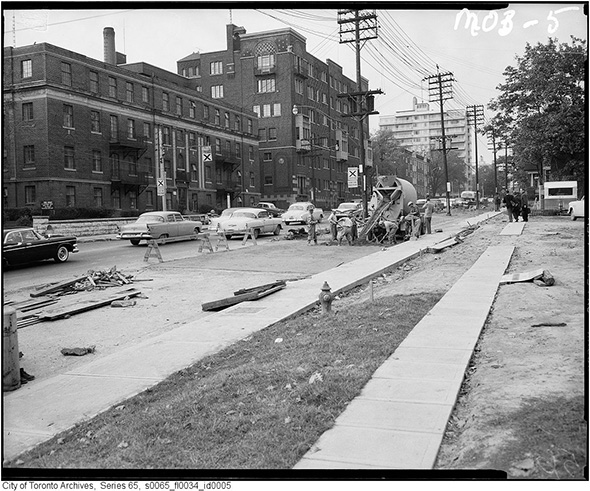Monarch Butterfly
Superstar
'Walking on a tightrope next to a highway': Coalition, councillor call for wider sidewalks on Avenue Road
From link.

Along Avenue Road, the width of the sidewalk widens and narrows over the course of the street, with some spots tightened by lampposts and buildings jutting out. (Richard Agecoutay/CBC News)
Avenue Road widening south of St. Clair, 1959

From link.
From link.
Avenue Road is known for high-end shopping, posh hotels, and multiple private schools.
It's also known, some residents say, for having dangerously-narrow sidewalks alongside heavy traffic.
"It's unsafe right now," said Albert Koehl, a member of the Avenue Road Safety Coalition. "This street is no longer consistent with a modern downtown area."
Koehl, a 25-year resident of midtown Toronto, is among those calling on the city to consider widening the sidewalks alongside the busy six-lane arterial road.
"People just want to live their lives on this street as we do in quiet residential areas, but it's still treated as a thoroughfare, as a highway, and that's inconsistent with what I think our Vision Zero road safety plan wants to do," he added.
The coalition, which includes residents' associations, school groups and other organizations, has reached out to local councillor Josh Matlow to take their mission to city hall, and Matlow said he's started a process to have city staff review Avenue Road and consult with stakeholders.
"The sidewalks are so narrow that it feels like walking on a tightrope next to a highway," he told CBC Toronto. "If we have multi-lanes for drivers, at least we can consider a few feet more for people walking to school every day."
'Controversial' to talk about pedestrian safety, councillor says
He's now bracing for potential pushback, given how polarizing redesigning roads can be.
"It always concerns me how controversial it is to talk about pedestrian safety," Matlow said.
One effort to radically redesign a stretch of Yonge Street in Willowdale led to sparring among councillors, with a plan backed by city staff to bring in wider sidewalks and bike lanes — while narrowing the road from six lanes to four — met with opposition.
In March 2018, the plan was deferred for more study, putting it on the back-burner.
This week, council debated the latest incarnation of Toronto's Vision Zero plan to end road deaths — and the topic of sidewalks came up, with a motion from Coun. Stephen Holyday successfully quashing the possibility of staff-imposed sidewalks for streets that don't have them at all.
Holyday, instead, secured veto-power for councillors, saying people are happy with the way many roads were built in decades past.
Koehl believes the mindset of keeping old streets as-is is problematic.
"This is all part of World War II thinking where all transportation problems are solved with wider roads and more cars," he said. "That might've worked then — though, it probably didn't — and it certainly doesn't work today with the number of people walking, cycling, taking transit."
Minimum sidewalk width is typically 2.1 metres
So how wide should sidewalks actually be in Toronto?
According to city staff, minimum pedestrian clearway width is 2.1 metres on most roads, with an exception of 1.8 metres on local roads with low traffic and low pedestrian volumes.
In some areas, those minimum standards can't be met because of "existing site restrictions," explained city spokesperson Hakeem Muhammad. On the flip side, going above the minimum can be appropriate, he said, such as in areas with high foot traffic, tourist attractions or transit hubs.
Along Avenue Road, the width of the sidewalk widens and narrows over the course of the street, with some spots tightened by lampposts and buildings jutting out.
"By anyone's definition of what safety is, this is too narrow," Koehl said.

Along Avenue Road, the width of the sidewalk widens and narrows over the course of the street, with some spots tightened by lampposts and buildings jutting out. (Richard Agecoutay/CBC News)
Avenue Road widening south of St. Clair, 1959

From link.




